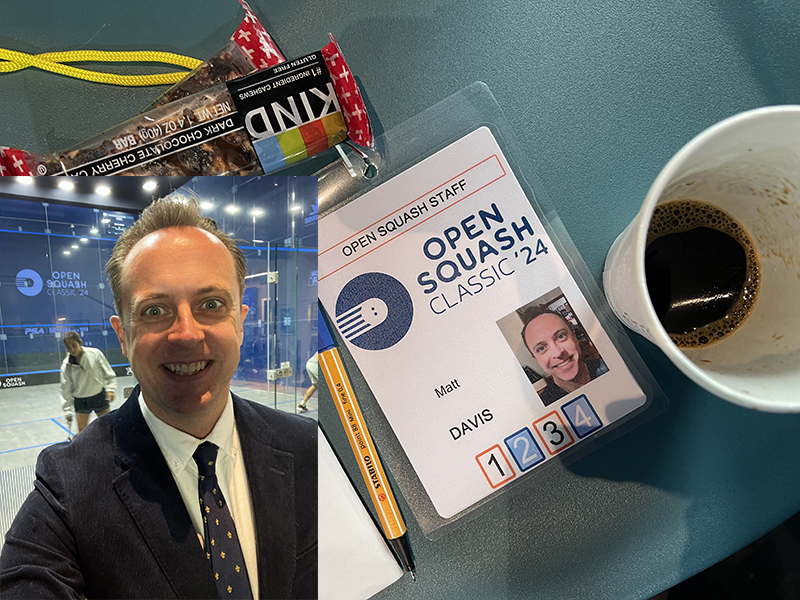I’m spending this week emceeing the Open Squash Classic, a squash tournament here in New York City. If you’re in town the finals are on Thursday night with tickets available all week. Hope to see you there (all proceeds support the community’s junior scholarship fund)!
My introductions of the players are broadcast on Squash.tv to viewers all over the world, so it’s a pressured gig. I enjoy preparing other people for broadcast appearances as part of my regular work. But when you do it yourself it brings a new focus onto the little things. So, I thought I’d share a few top tips, based on this week!
1. When you’re live, you can’t re-do it. So: It’s going to feel scary.
Many of my clients do live broadcast, but it’s still hard to prepare for that feeling of, “oh, wow, this is happening.” Like, you’re in front of thousands of people and they’re trusting you to make it fun and engaging. That’s something you can only experience to feel. You’ll forget important things. You’ll flub things. You have to accept that it’s not going to be perfect. Then you have to make the very best of it regardless. No matter how well prepared you are—I’ve practiced, I’ve been down to the venue and practiced, and more!—it’s scary. Feeling the fear and doing it anyway is a big part of the role. Your audience trusts you to take that on yourself and push through for everyone’s benefit. They want you to “anchor” things. It’s a position of trust and responsibility. There’s a side note to this, which is you can’t prepare enough. Learn how to pronounce everybody’s name—particularly if, for example, it’s “Velavan Senthilkumar”. And when you do pronounce it right, land it, then move on. Don’t pause for applause. You’re working!
2. Dress for the job you want.
If you dress smart, you’re showing your audience, “I want this, I’ve prepared, and I respect your time.” So, by the time you open your mouth, you’ve done more than half the work. I wore my most formal suit, best shoes and a somber tie. This isn’t about me being full of myself, it’s about showing that I understand the weight of the service I’m doing.
3. You can read from notes.
I can’t remember the details of 42 squash players’ careers, so I have them written on notes that I read from. Likewise when you’re on broadcast, you might have things you need to jog your memory. The audience doesn’t mind if you check your notes—it shows them, again, that you’re well prepared. I even think it gives them confidence. You can signal, “checking my notes”, or even check them in the open. Then you turn your attention back to the crowd and re-engage. It’s about being human and showing, “I’ve prepped.”
4. Be yourself.
Once you’ve ‘played yourself in’, it’s important to remember that people trust you to do this thing. That means they like you, and your wit and observations. If you’ve got something funny to say, say it. Oh my God, they might even laugh. But it’s not about you, either. It’s about the occasion. That’s the tightrope you’re walking.
5. Ask your genuine questions
When I’m interviewing the winning players after each match, I ask three questions. The first two are always based on things from the match. I tried hard to ask the things I would ask in a cafe afterwards. Not to ask “important questions” to make the venue or the player look good. So, for example, I’m never going to ask, “how about New York as a playing venue, eh?” Or “how are you enjoying New York City?” Those are the kinds of questions that get asked all the time at squash tournaments. The players always say “I love playing in X.” And “Yes the crowd are the best I’ve ever played in front of.” Yawn. Instead, yesterday, I asked Shahjahan Khan, who’d won 13-11 in the fourth, “there were times in that game that it looked like it might go to a fifth, do you ever think, ‘what am I going to have to do to put this guy down?’ Or I asked another player, Yahya Elnawasany, what happened when he was 2-0 down against a 19-year-old, to make him win. He told me, “I’m used to being the younger player beating the older guys,” and gave a fascinating answer. The answers are as interesting as your interest in asking the question. So, work hard to figure out what you’re interested in and then ask it.
6. Get feedback.
I’ve asked everyone who’s complimented my performance if they’d give me any feedback. I’ve also asked people what they’d like me to ask the players, if we’re chatting during games. You’re as strong as the people you’re working with. So don’t be afraid to open up and ask for their help. Go, team!
7. Bring two granola bars and drink decaf.
You’re unlikely to be able to eat when you need to, so have a Kind bar on hand. I drink decaf espresso to give my body the sense that, “this is a big occasion” without the jitters.
Alright, that’s all for now. I’ve got to go put my suit on and get ready for the Monday afternoon matches. Wish me luck!
—Matt Davis is a communications consultant and writer for a wide variety of clients. He also teaches yoga and lives with his wife and son in New York.


